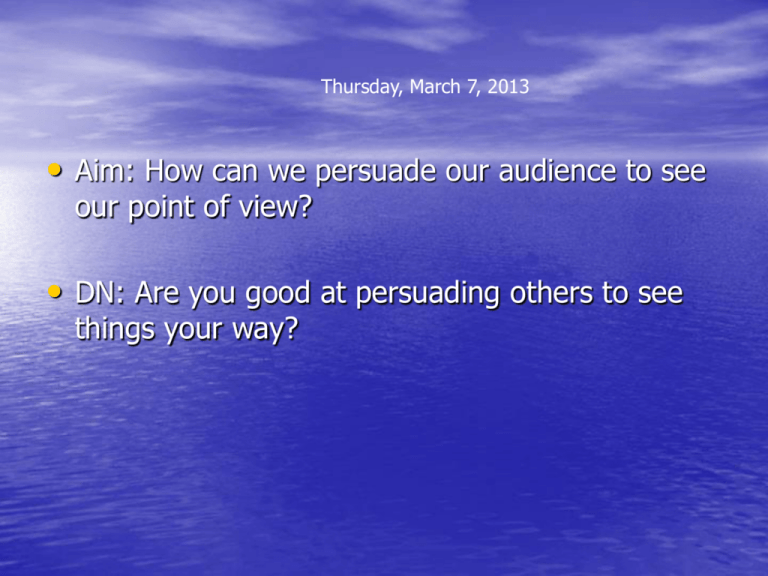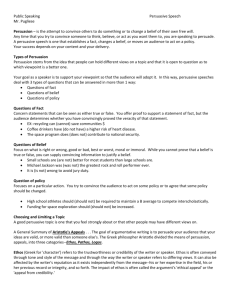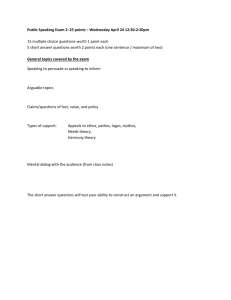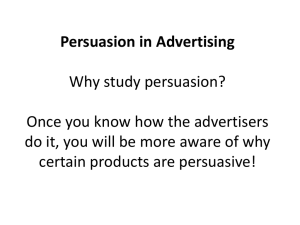September 5-8, 2006 - Sewanhaka Central High School District
advertisement

Thursday, March 7, 2013 • Aim: How can we persuade our audience to see our point of view? • DN: Are you good at persuading others to see things your way? Notes • Persuasion – is the attempt to convince • • others to do something or to change a belief of their own free will. Any time that you try to convince someone to think, believe, or act as you want them to, you are speaking to persuade. A persuasive speech is one that establishes a fact, changes a belief, or moves an audience to act on a policy. – Your success depends on your content and your delivery. Types of Persuasion • Persuasion stems from the idea that people • can hold different views on a topic and that it is open to question as to which viewpoint is a better one. Your goal as a speaker is to support your viewpoint so that the audience will adopt it. In this way, persuasive speeches deal with 3 types of questions that can be answered in more that 1 way: – Questions of fact – Questions of belief – Questions of policy Questions of fact • concern statements that can be seen as either true or false. You offer proof to support a statement of fact, but the audience determines whether you have convincingly proved the veracity of that statement. – EX: recycling can (cannot) save communities $ – Coffee drinkers have (do not have) a higher risk of heart disease. – The space program does (does not) contribute to national security. Questions of Belief • Focus on what is right or wrong, good or bad, best or worst, moral or immoral. While you cannot prove that a belief is true or false, you can supply convincing information to justify a belief. – Small schools are (are not) better for most students than large schools are. – Michael Jackson was (was not) the greatest rock and roll performer ever. – It is (is not) wrong to avoid jury duty. Question of policy • Focuses on a particular action. You try to convince the audience to act on some policy or to agree that some policy should be changed. – High school athletes should (should not) be required to maintain a B average to compete interscholastically. – Funding for space exploration should (should not) be increased. Choosing and Limiting a Topic • A good persuasive topic is one that you feel strongly about or that other people may have different views on. A General Summary of Aristotle's Appeals . . . The goal of argumentative writing is to persuade your audience that your ideas are valid, or more valid than someone else's. The Greek philosopher Aristotle divided the means of persuasion, appeals, into three categories--Ethos, Pathos, Logos. Ethos (Greek for 'character') refers to the trustworthiness or credibility of the writer or speaker. Ethos is often conveyed through tone and style of the message and through the way the writer or speaker refers to differing views. It can also be affected by the writer's reputation as it exists independently from the message--his or her expertise in the field, his or her previous record or integrity, and so forth. The impact of ethos is often called the argument's 'ethical appeal' or the 'appeal from credibility.' Pathos (Greek for 'suffering' or 'experience') is often associated with emotional appeal. But a better equivalent might be 'appeal to the audience's sympathies and imagination.' An appeal to pathos causes an audience not just to respond emotionally but to identify with the writer's point of view--to feel what the writer feels. In this sense, pathos evokes a meaning implicit in the verb 'to suffer'--to feel pain imaginatively.... Perhaps the most common way of conveying a pathetic appeal is through narrative or story, which can turn the abstractions of logic into something palpable and present. The values, beliefs, and understandings of the writer are implicit in the story and conveyed imaginatively to the reader. Pathos thus refers to both the emotional and the imaginative impact of the message on an audience, the power with which the writer's message moves the audience to decision or action. Logos (Greek for 'word') refers to the internal consistency of the message--the clarity of the claim, the logic of its reasons, and the effectiveness of its supporting evidence. The impact of logos on an audience is sometimes called the argument's logical appeal. Short-hand version: • Ethos: Ethical appeal - the source's credibility, the speaker's/author's authority • Pathos: Emotional appeal - the emotional or motivational appeals; vivid language, emotional language and numerous sensory details. • Logos: Logical appeal - the logic used to support a claim (induction and deduction); can also be the facts and statistics used to help support the argument. Persuasive Speech • You will deliver a speech in which you attempt to • • • • • PERSUADE your audience to think, believe, or act a certain way. You must complete the appeals outline. You must incorporate all three of Aristotle’s appeals – Ethos, Pathos, and Logos. You should consult and reference at least 3 sources in your speech to support your argument. Speech will be at least 3 minutes in length. You may use visuals, power point, etc in your presentation. The use of visuals is not mandatory. Friday, March 8, 2013 • Aim: How can we choose a topic for our persuasive speech? • Do Now: List three school policies that you disagree with. Write one sentence explaining why for each • Go to my HW page • Open the document titled “Persuasive Topics” • Browse the topics and choose 3 topics. • Begin preliminary research on each topic. • Pick a topic by the end of class.






